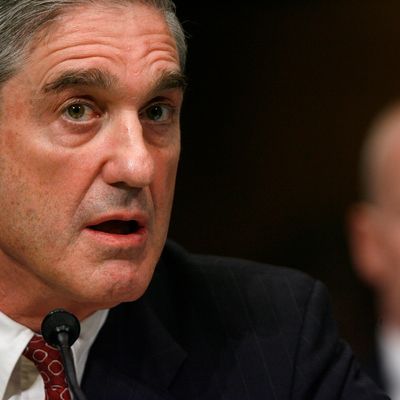
Christopher Ruddy, CEO of Newsmax (a right-wing media organ) and a close confidante of President Trump — indeed, Ruddy visited the White House on Monday — tells Judy Woodruff that Trump is considering firing special prosecutor Robert Mueller. The prospect has struck many people as the kind of outlandish move Trump might rant about in private, but would hesitate to actually do. But the administration has declined to repudiate the trial balloon. (Sarah Sanders says only that Ruddy “speaks for himself,” a non-response.)
Trump will probably not fire Mueller right away. But the odds that he will fire him eventually are quite strong, perhaps 50-50 or higher.
First, Trump has a very strong motive to fire Mueller: He is probably guilty. Several of Trump’s associates have obscured or lied about their meetings with or financial ties to Russia, Trump has taken a curiously pro-Russian approach to a series of diplomatic issues (including handing over sensitive information to Russian diplomats), and his son-in-law tried to establish a secret communications line to Moscow. Even if Trump and his inner circle turn out to be innocent of the underlying crime, he is obviously guilty of obstructing justice: demanding loyalty of the FBI director and asking him to halt an investigation into a presidential crony, asking other intelligence officials to make this request as well, firing the director, and then publicly admitting he did it to quash the Russia investigation is comically transparent fact pattern.
Trump continues to take actions that are difficult to explain if he is innocent and only sensible if he is guilty. A year ago, it seemed implausible to imagine that he could actually make it through the campaign without releasing his tax returns. What could he possibly have to hide that would be worse than the appearance of guilt he was inviting? Perhaps the answer is the same as why he might fire Mueller. What would be worse than the backlash from firing Mueller? The outcome of Mueller’s investigation, maybe.
Second, Trump has no intrinsic respect for political norms. He fired Preet Bharara, the U.S. attorney for the Southern District of New York who had investigative authority over some aspects of Trump’s business, after trying to ascertain his loyalty. He fired Comey after the same process. He pursues vendettas against those who challenge or threaten him with irrational vengeance. His need for deference and flattery is abnormal by the standards of either human beings in general or non-dictator politicians in particular. Trump is an instinctive authoritarian; the existence of an independent law enforcement system beyond his control is intolerable to him.
Third, Trump has endlessly violated a series of norms that appeared to be inviolable. From the outset of his candidacy, party officials warned him that his behavior — the absurd and promiscuous lying, refusal to disclose his tax returns, refusal to divest his business interests as president, undisciplined tweeting, and on and on — would have to stop.
These experiences have taught Trump that the caterwauling Republicans have no real power to hold him back. He can accuse Ted Cruz’s father of killing Jack Kennedy, and call his wife ugly, and however angry Cruz gets, Cruz will come crawling back. Republican warnings have always proved empty.
Why should the firing of Mueller play out much differently than the firing of Comey? The pro-Trump right will back him enthusiastically on Fox News and talk radio. The anti-anti-Trump right, a smaller and weaker faction, might initially object, but will quickly turn its attention to quibbling with or mocking his critics. (Get a load of this Berkeley professor who says firing Mueller is like the Reichstag fire! Or what about the time Bill Clinton or Barack Obama did something bad?)
Trump is not impervious to public opinion. He has already dropped to the 38-40 percent of the country that constitutes his hard-core base. But firing Mueller will play out as a process debate. The arguments conservatives will see on Fox News — that firing Mueller is legal, that Mueller had surrounded himself with suspiciously liberal lawyers — will carry the day with the base. The Republican Congress will put up no more resistance than it did in the face of the equally shocking act of demanding loyalty of Comey and then firing him. Only failures with tangible effect, like a recession, a failed war, or a bungled disaster response, could drive Trump’s approval rating down into the 20s, which is what it would take for Republicans in Congress to contemplate impeachment.
Finally, Trump’s erratic personality makes the firing of Mueller a mathematical probability. The way to game out the odds is not to try to figure out the factors playing in Trump’s mind, or the arguments mustered by competing advisers. This is far too rational. It assumes the decision will be made in a singular moment.
Trump is a creature of impulses. Every time he is reminded of Mueller’s existence, there is some chance he will immediately move to fire him. The chance that he will act upon his urge at any given moment is small — say, one percent — but the number of the moments will be high.
And it is probably realistic to assume that every time Trump is persuaded to repress his instinct to fire Mueller, the difficulty of maintaining his discipline the next time rises. If there is a one percent chance Trump fires Mueller the next time he sees a Russia story on cable news, perhaps the odds rise to one and a half percent the next time, and two percent the time after. These numbers are obviously pure guesses. But the general principle accords with the style of decision-making Trump has displayed from the outset.
Trump is almost characterologically bound to test the limits of the system until he finally goes so far he cannot go any further. Firing the special prosecutor is the next unthinkable step before him, very much like all the other unthinkable steps he has already taken.






























